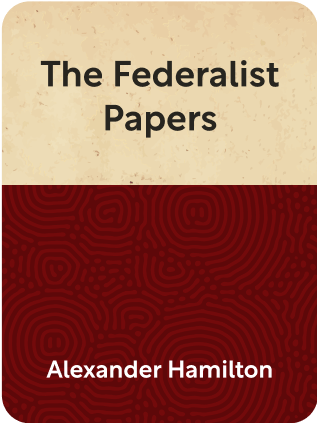

This article is an excerpt from the Shortform summary of "The Federalist Papers" by Alexander Hamilton. Shortform has the world's best summaries of books you should be reading.
Like this article? Sign up for a free trial here .
What is Federalist 68 about? How does Federalist Paper 68 explain and defend the Electoral College?
Federalist 68 is about the way the President is elected. The Electoral College gives power to the states in choosing who leads the country.
Read more about Federalist 68.
Federalist 68
Despite the considerable powers of the presidency, the office’s authority was heavily restricted by the provisions of the Constitution. Unlike a monarchy, the presidency was not a hereditary office conferred upon the incumbent by right of birth and held for life; instead, the president was elected (albeit indirectly) by the people through the Electoral College and served a fixed term of four years. Presidents could run for reelection as many times as they wished, but, unlike a king, would face political competition for their office.
Indeed, the states would play a key role, according to Federalist Paper 68. The Electoral College guaranteed that the president would not be chosen in a national election that treated the states as non-entities. The states were the elemental unit in the Electoral College, with each state receiving electoral votes equal to its combined number of representatives and senators.
The President is indirectly elected by the members of the Electoral College, a body of electors chosen specifically for the purpose of choosing the chief executive. Lastly, the new Constitution expressly prohibited the establishment of titles of hereditary nobility. The supporters of the new government believed that these safeguards made it essentially representative in character.
The Three-Fifths Compromise and the Electoral College
We’ve already seen how each state’s number of House members was to be tied to its population, as determined by the decennial census. But this didn’t answer the question of enslaved people. How were they to be counted? Federalist 68 helps answer that.
The slaveholding states (located primarily in the South) had insisted at the Constitutional Convention that enslaved people be counted as full persons for purposes of representation (which would have given the South an outsized influence in Congress), but not for purposes of direct taxation (which would reduce the federal tax burden to be borne by the slaveholding states). In other words, southerners wanted to treat slaves as people when it would benefit them, and as property when that would benefit them.
Eventually, the delegates reached the notorious Three-Fifths Compromise. This stated that enslaved people were to count as three-fifths of a person for both federal representation and for direct taxation.
(Shortform note: This concession to the South gave the region an influence over national politics out of all proportion to its numbers of free white voters. It enabled the slaveholding states to gain additional representatives in the House as well as votes in the Electoral College that they wouldn’t have otherwise had. The compromise was only repealed by the Fourteenth Amendment in 1868, which explicitly stated that representation was to be allotted based on “the whole number of persons in each State.”)

———End of Preview———
Like what you just read? Read the rest of the world's best summary of Alexander Hamilton's "The Federalist Papers" at Shortform .
Here's what you'll find in our full The Federalist Papers summary :
- The genius of the founding fathers in how they designed the United States Constitution
- Why it was critical for the United States to form a union rather than stay separated as colonies
- How Alexander Hamilton anticipated social issues that are still relevant today






